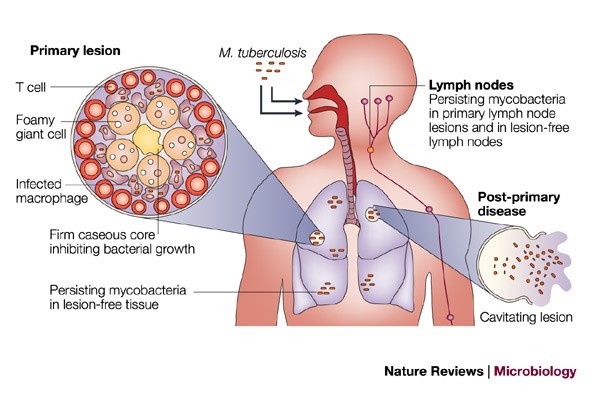Tuberculosis (TB)

Tuberculosis (TB): Symptoms, Diagnosis, and Management
Tuberculosis (TB) is a chronic, infectious disease caused by the bacterium Mycobacterium tuberculosis, primarily affecting the lungs but potentially involving other organs. Below is a detailed overview of its key aspects, supported by current evidence.
Symptoms
Symptoms of active TB disease include:
- Persistent cough lasting more than three weeks.
- Chest pain or discomfort.
- Coughing up blood or mucus (sputum).
- Fatigue, weakness, or feeling unwell.
- Loss of appetite and unintentional weight loss.
- Fever, chills, and night sweats.
Latent TB: No symptoms; individuals are not contagious but can develop active TB if untreated.
Causes and Risk Factors
Primary Cause:
- Mycobacterium tuberculosis: Spread through inhalation of droplets containing the bacteria, often in crowded environments.
- HIV/AIDS: Significantly increases susceptibility to TB.
- Malnutrition: Impairs immune function.
- Poor living conditions: Overcrowding and poor ventilation facilitate transmission.
- Previous TB exposure: Increases risk of reactivation.
Diagnosis
Physical Examination:
- Lung auscultation: Listening for abnormal sounds.
- Lymph node examination: Checking for swelling.
TB Tests:
- Tuberculin skin test (TST): Measures immune response to TB proteins.
- Interferon-gamma release assay (IGRA): Blood test detecting immune response.
Imaging and Sputum Tests:
- Chest X-ray: Identifies lung abnormalities.
- Sputum smear and culture: Confirms active TB by detecting bacteria.
- Nucleic acid amplification tests (NAATs): Rapidly diagnose TB using sputum samples.
Treatment
Active TB:
- Antibiotic regimen: Typically involves isoniazid, rifampin, pyrazinamide, and ethambutol for at least 6 months.
- Drug-resistant TB: Requires specialized treatment regimens.
Latent TB:
- Isoniazid monotherapy or rifampin for 3–9 months to prevent progression to active TB.
Complications
- Extrapulmonary TB: Involves organs like the spine, kidneys, or brain, leading to specific symptoms (e.g., back pain, confusion).
- Drug resistance: Emergence of strains resistant to standard antibiotics complicates treatment.
- TB meningitis: A severe form affecting the brain and spinal cord.
Conclusion
TB is a treatable disease but requires early diagnosis and adherence to antibiotic regimens to prevent complications and transmission. Regular screening in high-risk populations is crucial for controlling TB globally.
Consult with Our Team of Experts Now!
At DrStemCellsThailand (DRSCT)‘s Anti-Aging and Regenerative Medicine Center of Thailand, we emphasize comprehensive evaluations and personalized treatment plans of Cellular Therapy and Stem Cells for managing various health conditions. If you have questions about Tuberculosis (TB) or would like more information on our services, consult with our experts today!
Consult with Our Team of Experts Now!
References















